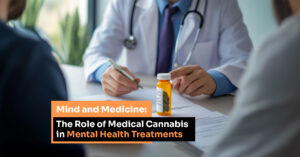Nachrichten
Nachrichten und aktuelle Informationen auf einen Blick
Mind and Medicine: The Role of Medical Cannabis in Mental Health Treatments

In recent years, medical cannabis has emerged as a topic of growing interest in the mental health arena. As patients and clinicians explore alternative therapies, research on its use in managing conditions such as anxiety, depression, and post-traumatic stress disorder (PTSD) continues to expand. While promising findings point to potential benefits, significant debates and controversies also surround its application in mental health care.
Cannabis and Anxiety
Research into cannabis and anxiety presents a complex picture. Cannabidiol (CBD), one of the primary non-psychoactive components of cannabis, has been shown in some studies to reduce anxiety in both preclinical models and small-scale human trials. CBD may help modulate serotonin receptors and the endocannabinoid system, leading to feelings of calm. However, it is crucial to note that the effects can vary significantly depending on the dosage, the individual’s biology, and the specific strain or composition of the cannabis product used.
Cannabis and Depression
Depression is another area where medical cannabis has been investigated for its potential therapeutic effects. Some patients report improvements in mood and overall well-being when using cannabis, particularly strains with balanced levels of CBD and tetrahydrocannabinol (THC). THC, the psychoactive component, might help elevate mood for some individuals. Yet, clinical research on cannabis as a treatment for depression remains in its infancy. Concerns persist regarding the risk of dependency, as well as the possibility that high THC concentrations may exacerbate depressive symptoms in some cases.
Cannabis and PTSD
Post-traumatic stress disorder (PTSD) has garnered particular attention within the cannabis research community. Studies suggest that cannabis may help mitigate some symptoms of PTSD, such as hyperarousal and insomnia, by influencing the neural circuits involved in fear and stress responses. Some veterans and trauma survivors have reported substantial improvements in sleep quality and reductions in flashbacks and anxiety after using cannabis-based treatments. Despite these encouraging findings, the evidence is still mixed, and further rigorous, large-scale trials are necessary to fully establish its safety and efficacy.
The role of medical cannabis in treating mental health conditions such as anxiety, depression, and PTSD is a field marked by both promise and complexity. While preliminary research suggests that cannabis—especially formulations rich in CBD—might offer a natural, personalized approach to managing symptoms, significant challenges remain. Variability in individual responses, potential risks of dependency, and inconsistent research findings underscore the need for cautious optimism.
As scientific inquiry continues to evolve and regulatory environments adapt, medical cannabis may well carve out a niche within the broader spectrum of mental health treatments. For now, it remains a topic of active investigation, with ongoing debates fueling both hope and caution among patients, clinicians, and policymakers alike.
Follow mediproCan instagram

